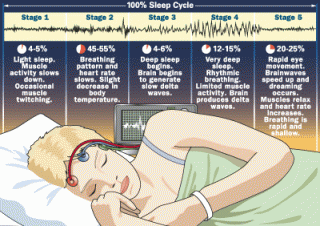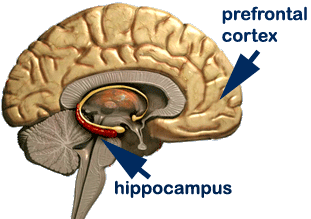Sleep
The Prefrontal Cortex During Sleep
What research with older persons implies about sleep and children’s learning
Posted February 7, 2013
Recent neuroscience studies using functional magnetic resonance imaging (fMRI) have enhanced our understanding of how sleep is related to learning and memory. A study just reported in the journal Nature Neuroscience by a UC Berkeley research team (Mander et al. 2013) provides exciting new insights. We have long known that certain kinds of memory decline in normal aging. Also known is that older adults frequently have short duration and poor quality sleep. In this study, older adults were compared with young adults on tasks that required learning new associations between familiar words and nonsense words (e.g. bird – jubu). Each group was initially trained to associate a list of word pairs to a similar criterion of accurate recall. They were tested for recognition memory 10 minutes later and then both groups slept for 8 hours. During sleep, their sleep was monitored via polysomnography with full head measurement of electroencephalographic (EEG) activity. The next morning, the groups were again tested for memory of the learned word pairs, this time during an fMRI scan. The scan was specifically focused on the hippocampus and the prefrontal cortex, both of which are involved in memory. The prefrontal cortex is involved in learning new material, and during sleep, connections are consolidated, strengthened, and modified through communication between the prefrontal cortex and the hippocampus.
Differences between short-term (10 min.) and long term (overnight) memory for the word pairs indicated how much memory was retained overnight. Younger adults remembered more word pairs than older adults in both the short-term and overnight conditions. Both groups remembered fewer word pairs in the overnight condition compared with short term. But the critical finding was that the difference between conditions was far greater for the older adults. Older adults also showed less brain matter volume in the medial prefrontal cortex, presumably due to gradual atrophy with aging, and exhibited less time in slow wave sleep, the period of sleep characterized by EEG activity of slow frequency and high amplitude (Stage 4- very deep sleep in the illustration). Brain volume was related to both memory and slow wave electrical activity during sleep.

Now we turn to considering the implications for children and adolescents. All brain structures including those discussed here are developing during childhood and adolescent years. The prefrontal cortex has been studied extensively, and now is known to be one of the last brain structures to mature, with full maturation only occurring in the mid-20’s (http://www.hhs.gov/opa/familylife/tech_assistance/etraining/adolescent_brain/Development/prefrontal_cortex/). While maturation of the hippocampus and its connectivity with the prefrontal cortex is less well understood, it is clear that learning and memory depend on their efficient operation. And it becomes increasingly clear that sleep, particularly slow wave sleep, is involved with this process.

Young children experience more slow wave sleep episodes and longer episodes than do older children and adolescents (Jenni & Carskadon, 2004), and slow-wave sleep is no doubt instrumental in consolidating and strengthening memory for the large amounts of new information children are learning. Accordingly, having children sleep sufficient amounts of time is crucial for optimal cognitive development. Since there are only 3 to 4 slow-wave sleep periods every night and those occur every 90 minutes or so, losing even an hour of sleep could reduce the number of slow-wave periods by 25%. Consequences of poor sleep for adults are very likely less serious than for children and adolescents whose brain structures and pathways are not fully developed and who are also expected to learn enormous amounts of information about many topics in school and elsewhere. The focus here has been learning, memory, and cognitive development. In another post, I will discuss sleep and another important aspect of development, emotion regulation and adjustment.


